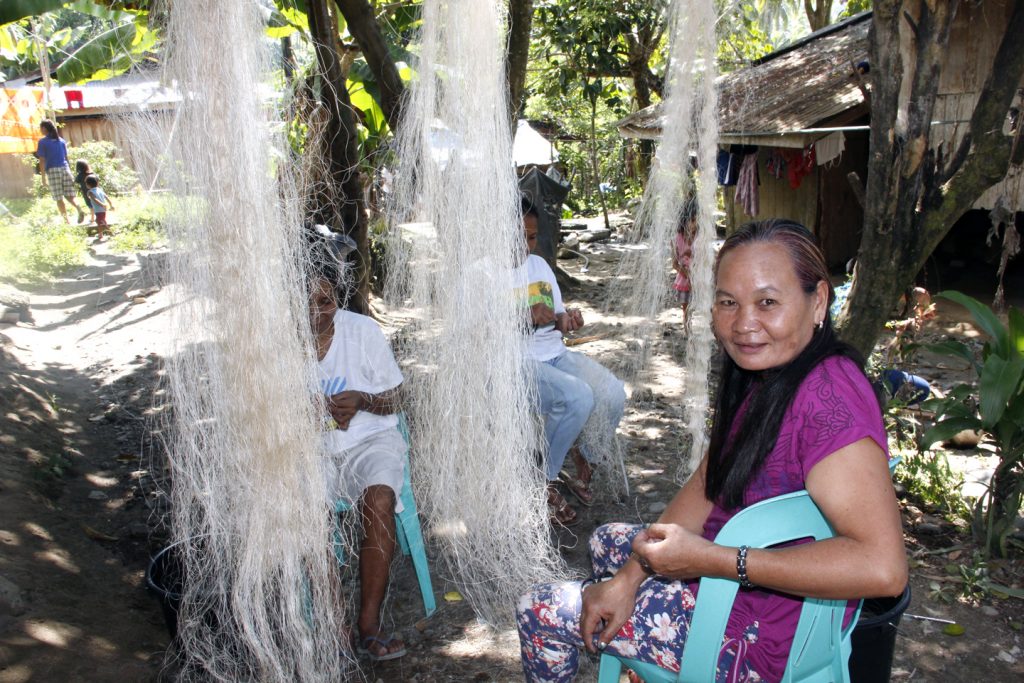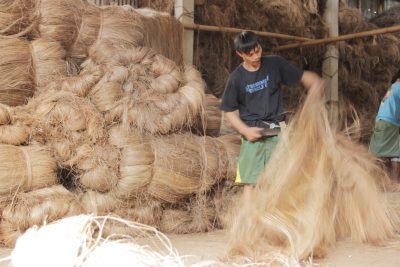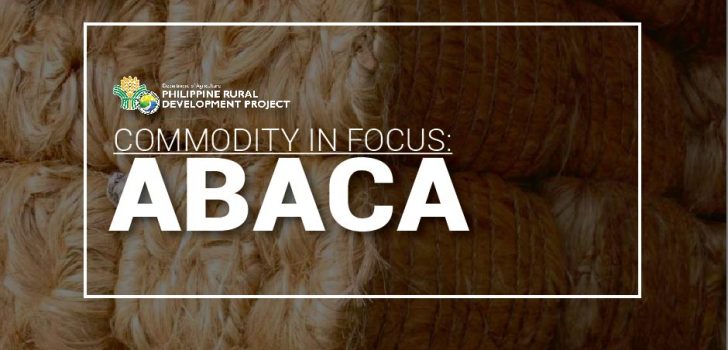
Commodity in Focus: Abaca
As countries around the world struggle to deal with the threat of COVID 19, demand for abaca has put the Philippines on the map. Abaca, scientifically known as Musa textilis, is a type of banana plant that is native to the Philippines but is also grown in countries such as Ecuador and Costa Rica. Also known as Manila hemp, abaca fibers have been used in a wide range of application such as textiles, specialty paper, ropes, etc. Because of its unique porous properties, abaca is an ideal material for medical fabric such as for face masks and medical PPE’s.
According to Kennedy Costales, executive director of the Philippine Fiber Industry Development Authority (Philfida), face masks, gowns, shoe covers, head covers and PPE represented only less than 1 percent of the total annual abaca production in the Philippines prior to COVID 19. The increase in demand for these has also caused a spike in the demand for the prized commodity.
The Philippines is the world’s number one producer of abaca supplying 85 percent of the global market requirement which brings in about P4.7 billion to the economy. Despite this, the full potential of the abaca sector is yet to be realized considering that production methods in the Philippines still remain rudimentary compared to other countries that produce the fiber crop.
Abaca is one of the top priority commodities being supported by Department of Agriculture Philippine Rural Development Project (DA-PRDP). In the Mindanao cluster, enterprise support for abaca production is at P65 million, with an additional P44 million allocated to infrastructure support. This total is distributed to 19 different proponent groups in the different provinces in the cluster.
In Sarangani province, the United Maligang Farmers’ Multipurpose Cooperative (UMFMPC) received P35.7 million support for the “Enhancement of Production, Processing and Marketing to High Quality Abaca Fiber” subproject. The cooperative, which is mostly comprised of indigenous T’boli, aims to produce 2,200 kg per hectare of fine quality fiber from their previous production capacity of 500 kilograms.
Under PRDP, this abaca enterprise will operate across the province with six clusters. Two clusters will cover Kiamba, and one from each town of Maitum, Maasim, Alabel and Malungon, which will directly benefit 370 farmers. The cluster aims to produce a consolidated total of 107,000 kilograms of baled abaca every month.
Operations in charge Dante Tumaro said the main products for marketing will be the high-quality baled abaca fiber and tinagak, a special and fine abaca thread, which comes from 20 percent of the interior pulp of the abaca plant. Tinagak processing will employ 60 women members in Barangay Maligang, where a processing center will soon be built for them
With the improvement in production, the cooperative has already begun exploring export opportunities and has already shipped out orders from a Chinese buyer for their abaca products. With PRDP support, they hope to be able to meet the initial requirement of six to eight metric tons of abaca products monthly from their capacity of fix to six metric tons per month.
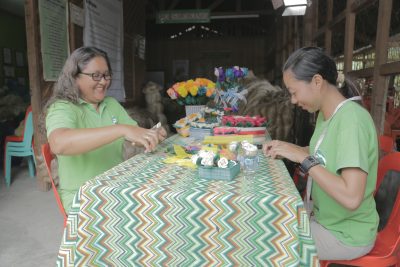 The remote T’boli community is also a recipient of 4.3 kilometer Kayupo-Maligang Farm-to-Market Road, amounting P47.46 -million, which has solved the transportation woes of the community and has helped abaca farmers expand their farms.
The remote T’boli community is also a recipient of 4.3 kilometer Kayupo-Maligang Farm-to-Market Road, amounting P47.46 -million, which has solved the transportation woes of the community and has helped abaca farmers expand their farms.
The construction of another farm-to-market road, the P57 million Kanalo-Nomoh farm-to-market road (FMR) in Maasim is also expected to help boost the production of abaca in the province as it is expected to not only increase agricultural production by the improving transport of goods, but also improve the delivery of social services in the community. Nomoh is widely known for producing abaca, which is the main commodity considered for the approval of the P57M fund from PRDP.
In addition to these, PRDP through their Regional Project Coordination Office (RPCO) 12, and in partnership with the Philippine Fiber Industry Development Authority (PhilFIDA) conducted a series of trainings in September 2019 for abaca farmers in Sarangani. Close to 200 farmers, mostly coming from the T’boli, Tagacaolo and B’laan tribes were trained on new planting and production technologies, and processes on weaving. It is hoped that with these trainings, farmers would adapt to new methods and technology and boost their production.
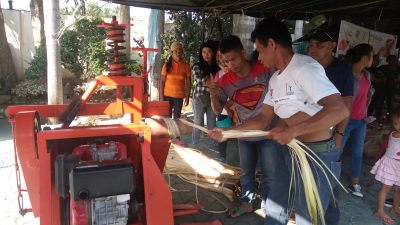 Meanwhile in Zamboanga del Norte, the Agrarian Reform Beneficiaries of Marcelo Cooperative (ARBEMCO) was the recipient of the P2.94 Million “Abaca Fiber Production and Marketing Enterprise” sub-project from PRDP. Under this subproject, the cooperative is set to receive a 6-ton hauling truck and 8 units decorticating machines plus personal protective gears and bolos needed for its abaca fiber production and marketing enterprise. With PRDP support, ARBEMCO hopes to gain a 5% increase in household income of their abaca farmers and an increase in production area from 130 hectares to 230 planted to abaca.
Meanwhile in Zamboanga del Norte, the Agrarian Reform Beneficiaries of Marcelo Cooperative (ARBEMCO) was the recipient of the P2.94 Million “Abaca Fiber Production and Marketing Enterprise” sub-project from PRDP. Under this subproject, the cooperative is set to receive a 6-ton hauling truck and 8 units decorticating machines plus personal protective gears and bolos needed for its abaca fiber production and marketing enterprise. With PRDP support, ARBEMCO hopes to gain a 5% increase in household income of their abaca farmers and an increase in production area from 130 hectares to 230 planted to abaca.
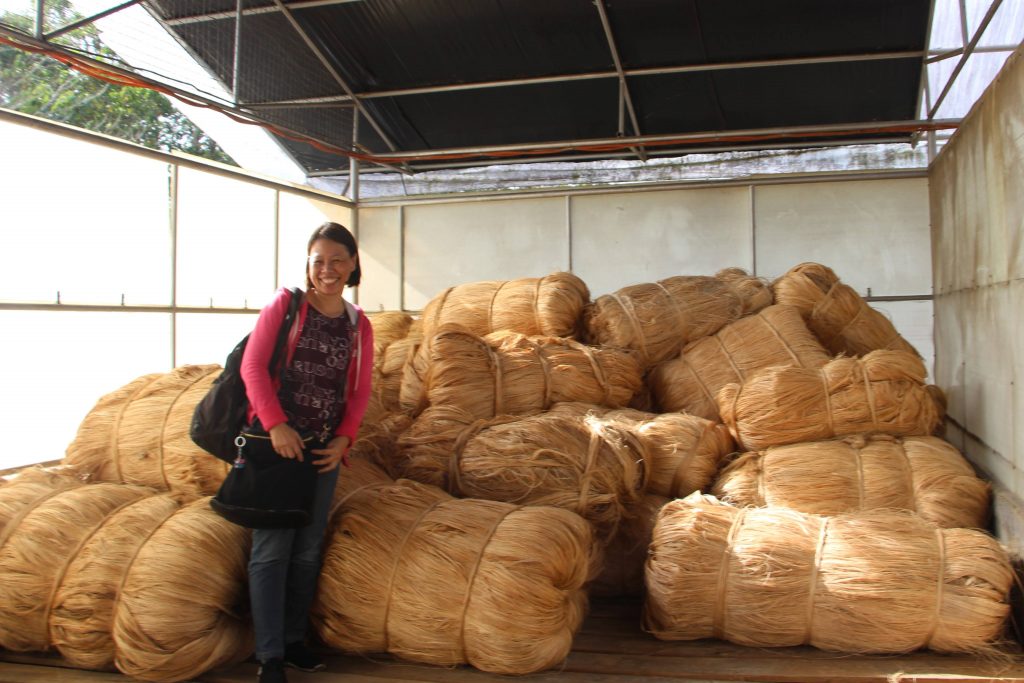 Abaca farming has also become a viable source of income for the Tapak Farmers Marketing Cooperative (TFMC) in Paquibato district in Davao. The cooperative which is predominantly from the Ata tribe, transitioned from corn and rice production to abaca when their crops were decimated by rats in 2014. Since then, abacas has become the coop’s primary commodity covering 87 hectares of their farm areas and have been supplying about two tons of S2 abaca fibers to Ching Bee Trading corporation, a Filipino company that has been exporting natural fibers since the 1940s.
Abaca farming has also become a viable source of income for the Tapak Farmers Marketing Cooperative (TFMC) in Paquibato district in Davao. The cooperative which is predominantly from the Ata tribe, transitioned from corn and rice production to abaca when their crops were decimated by rats in 2014. Since then, abacas has become the coop’s primary commodity covering 87 hectares of their farm areas and have been supplying about two tons of S2 abaca fibers to Ching Bee Trading corporation, a Filipino company that has been exporting natural fibers since the 1940s.
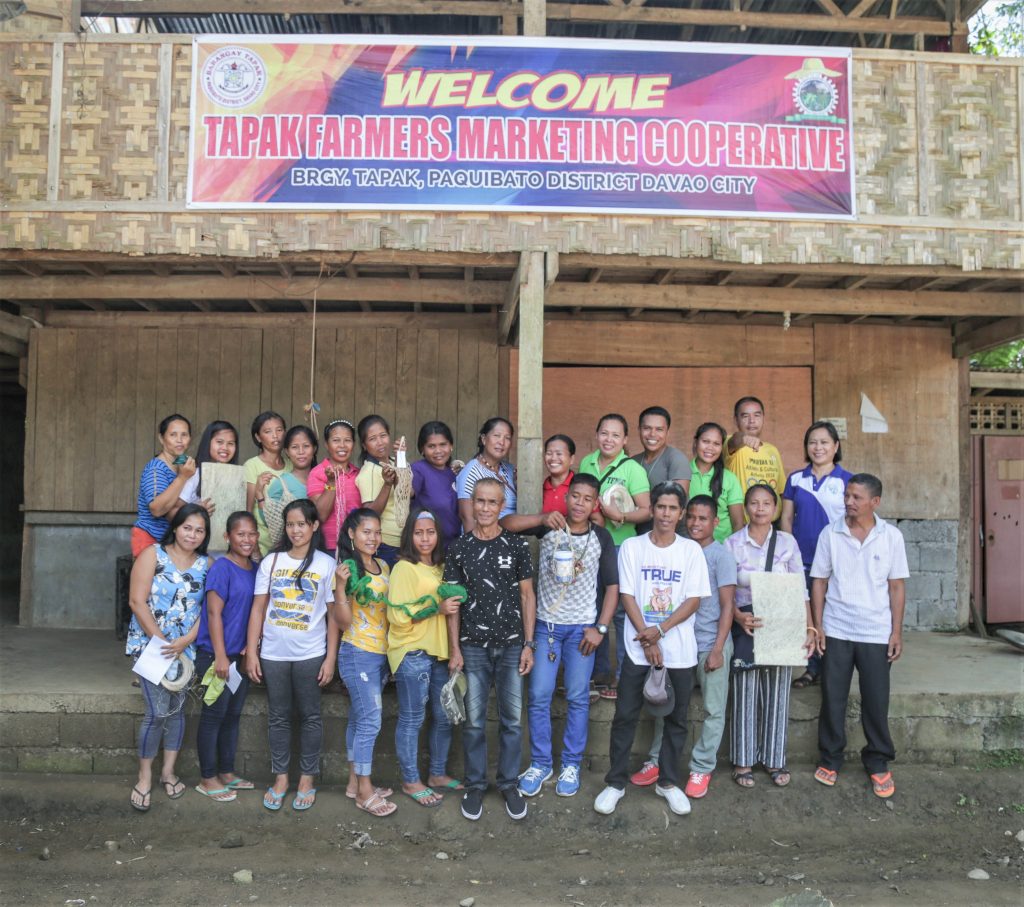 To meet up with the increasing demands for abaca fibers, the cooperative availed of the P10.82 million “Abaca Processing and Marketing Enterprise Project” from PRDP which will provide them with four (4) post-harvest facilities (storage and solar dryer) in the following four production areas in Sitio Tapak Proper, Butay, Mangani, Panlawayan. A total of seven (7) stripping machines will be provided for the four facilities which will hopefully help them reach a target procurement of 1,500 MT and a total production of 150 MT of abaca fiber annually.
To meet up with the increasing demands for abaca fibers, the cooperative availed of the P10.82 million “Abaca Processing and Marketing Enterprise Project” from PRDP which will provide them with four (4) post-harvest facilities (storage and solar dryer) in the following four production areas in Sitio Tapak Proper, Butay, Mangani, Panlawayan. A total of seven (7) stripping machines will be provided for the four facilities which will hopefully help them reach a target procurement of 1,500 MT and a total production of 150 MT of abaca fiber annually.
San Isidro Upland Farmers Multi-Purpose Cooperative (SIUFMULCO), a cooperative with more than 300 members in Agusan del Norte, also supplies abaca to Ching Bee Trading Corporation. The cooperative is the recipient of the P12.95M “Integrated Abaca Enhancement Enterprise” subproject from PRDP which is aimed at developing the abaca industry in the province of Agusan del Norte by expanding their production to 300 hectares. This expansion is expected to yield an additional 30,000 kilos of fiber annually giving the enterprise an additional income of PhP7.2 Million. The project will also provide infrastructure support and equipment needed to improve product quality and increase productivity, as well as marketing support for efficient delivery system to the end-users/buyers.
Last January 23, 2020, PRDP hosted the Mindanao-wide Stakeholders Consultation for Abaca in Butuan City. The event was attended by over 70 abaca stakeholders in Mindanao including industry experts and representatives from Philippine Fiber Development Authority (PhilFIDA), Department of Agriculture (DA), Department of Trade and Industry (DTI), Local Government Unit representatives, farmers and farmer groups representative, traders, and processors. The activity served as a venue to validate existing data and obtain more information on the status of the abaca industry in Mindanao with the end goal of updating the value chain analysis (VCA) for abaca fiber and other abaca products.
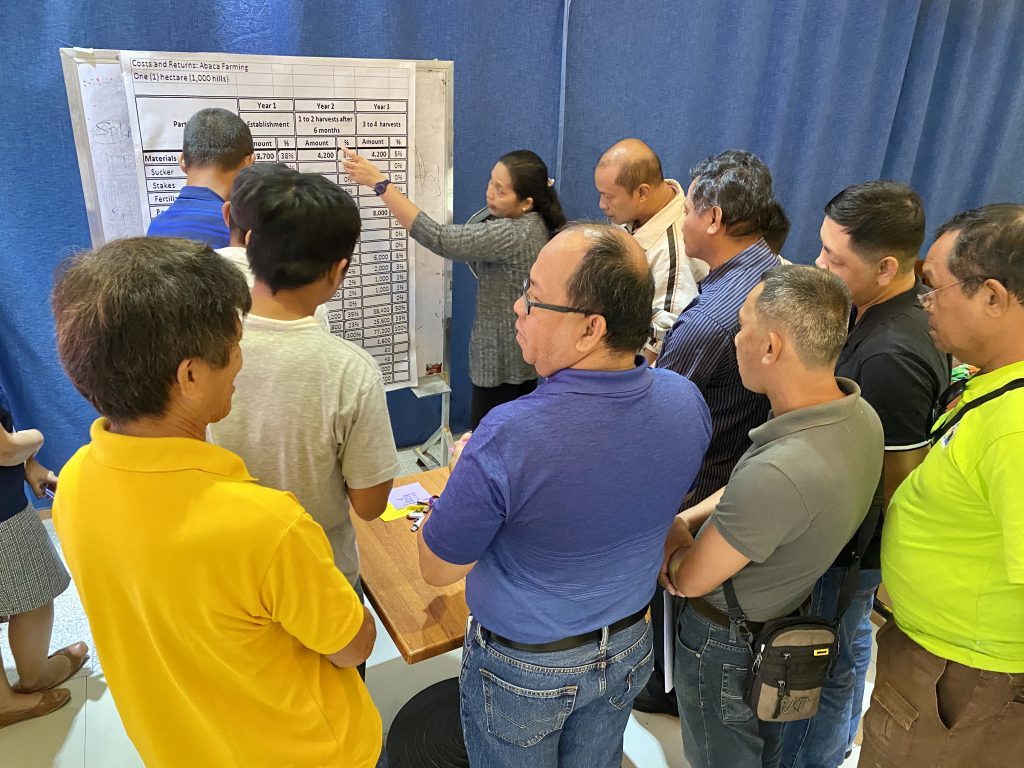 Regarding the abaca industry, Department of Agriculture Secretary William Dar said the immediate challenge was how to develop cash crops under the “new landscape agriculture” wherein means of production must become more resilient to crises, such as the current coronavirus pandemic.“There are technologies that can scale up the utilization of abaca. We should be able, in the future, to create an environment where local farmers and manufacturers would benefit,” Dar said.
Regarding the abaca industry, Department of Agriculture Secretary William Dar said the immediate challenge was how to develop cash crops under the “new landscape agriculture” wherein means of production must become more resilient to crises, such as the current coronavirus pandemic.“There are technologies that can scale up the utilization of abaca. We should be able, in the future, to create an environment where local farmers and manufacturers would benefit,” Dar said.
As it enters its sixth year, DA-PRDP continues to provide the necessary skills and enterprise and infrastructure support to bring abaca farmers in Mindanao and the Philippines closer to that reality.

